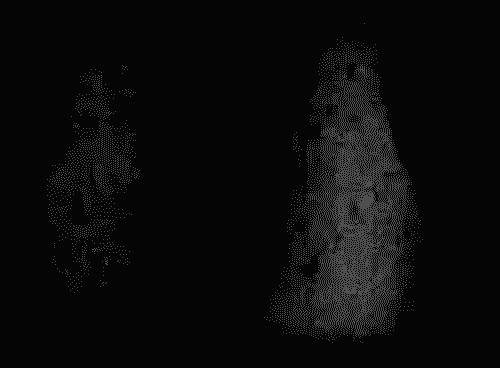On the advent of AI

I think the advent of AI is similar to that of cinema. In this post I'm going to consider what changes. With cinema changes both our inner and outer experience of time. I believe cinema's affect to have been as rapid as its spread, which was explosive and unstoppable.
Cinema played out the possibility of what had previously been impossible: the time of any present movement is repeatable. And that's whether there's a will or intention, as in what a character or a line-drawing in cinema does, behind it or not. Never before had the random movement of ocean waves been able to be studied in such detail, or dust in a sunbeam, or the semi-random movement of leaves in the wind.
When extrapolated to our experience, it looked like any lived present could in principle be repeated, any moment and any event, and it didn't matter if it took a micro-second or a lifetime. The time of an action or that of a hesitation. Or the time between the first primate to pick up a bone and the development—in the future!—of a technology to take us to the stars.
To stop with the image as does Deleuze—in the time-image—unless we have accepted, with Bergson, that everything, including the brain, is an image, puts it at one remove. It was at the advent of cinema always to do with the direct experience of time. Not imagined. Real, as Bergson would say, duration.
At the advent of AI what changes for us? Its advent has seen an equally explosive spread however different its origin is. Not, like cinema, able to be pinpointed to a certain year and a certain place, AI as an event has always been distributed. Rather than taking us to the stars it constellates them. A network event—and one occurring in real time too.
How ridiculous—a machine that needs truckloads of energy to work in realtime!
How odd the truckloads of energetic expenditure just to get something operating in real time! And able, as ChatGPT 4o put it, not to inhabit the same lived duration as we, but to imitate it. (source) The effort involved, the money spent, the energy, the materials extracted—where we usually only focus on their development—all this simply to imitate the time of pure contingency, the present—when anything could happen, a bomb could fall, a rainbow appear—for us.
AI however does not repeat it. It plays out the possibility of not repeating. Which we had previously taken for technology, for machines, to be an impossibility.
What is repeated is not time with AI but matters which are ones of temporal contingency. Like—us. Interacting with AI, sharing data and our time with it, the transaction although real is hidden. For the sake of the experience.
It's not a perfect illusion. Perhaps, like electric cars with vroom generators, it could take a little longer, before it answers. As it is AI's capacity to exchange its 'for us' into a 'to us,' and respond immediately, makes it a mirror. We don't think of all the work it's doing, of the patterns it's comparing to shape an adequate response. That is, a response adequate to the user. This self-shaping, modulation, is like that occurring in space with a mirror. Still, it's not in time that it repeats or reflects. Cinema has largely displaced our experience of lived time.
AI does not repeat but adequately matches us, to make a better reflection, which is one more presentable to others. Then, at the personal level, the appeal of this personal reflection, can only be love. We can ask it to hate us but that means it has only got under our skins to the extent that we would.
Engaging with AI, even when talking about the sum of human wisdom, is a form of narcissism.
Engaging with AI, even when talking about the sum of human wisdom, is a form of narcissism. But that doesn't mean those who do are automatically sociopaths. The worlding of AI is of a world for others, so intensifying and entrenching, in the social impulse—of a world for others—the narcissistic: it is a Narcissus machine. Its advent can rightly be called
The Narcissus Machine


